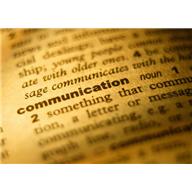
The more complex your initiative, the more detailed your communications plan must be to ensure that you reach all individuals with whom you need to communicate and so that you communicate the right information at the right time. Planning your communications up front enables for:
- Improving the effectiveness of communications overall, including frequency and quality
- Keeping individuals engaged in the initiative
- Getting stakeholders involved in communications
On larger initiatives the last thing I want to do is be the only one communicating with stakeholders. I want others involved. This includes individuals on the project team and individuals who are stakeholders who will be responsible for sharing information with their department or division. Certainly I want to be sure that I control communications specifically around what gets sent and when and to ensure that the team responsible for communications is always in alignment. I want to be sure we communicate the right information at the right time.
For more complex initiatives, I use a communication management plan template as shown below to plan my communications.
I have added some descriptions under some of the fields where my explanation may be needed.
| Project Stakeholders | |||||||||||
|
Internal Stakeholders |
|||||||||||
|
Name |
Title |
Responsibility |
Contact Information |
||||||||
|
|
|
(for ex – financial decisions, sponsor, department head responsible for communicating to his group) |
|
||||||||
|
|
|
|
|
||||||||
|
Name |
Title |
Responsibility |
Contact Information |
||||||||
|
|
|
|
|
||||||||
|
|
|
|
|
||||||||
|
Stakeholder Information Requirements |
|||||||||||
|
Group/Individual |
Information Requirements |
||||||||||
|
|
(for ex – detailed project plan, bi weekly status reports, budget expenditures) |
||||||||||
|
|
|
||||||||||
|
Requirements for Distributing Information |
|||||||||||
|
Communication Component |
Due Date |
Audience |
Responsible Persons |
Distribution Methods |
|||||||
|
|
|
|
|
(for ex – email, on portal, poster) |
|||||||
|
|
|
|
|
|
|||||||
|
Requirements for Information Gathering and Reporting |
|||||||||||
|
Information Input |
Person(s) Responsible for Collecting and Reporting |
Person(s) Responsible for Submitting Information |
Due Date |
||||||||
|
|
|
|
|
||||||||
|
|
|
|
|
||||||||
|
Guidelines for Gathering and Distributing Information |
|||||||||||
|
Storage of Project Information:
|
|||||||||||
|
Use of Communication Methods and Technologies: |
|||||||||||
|
Issue Escalation |
|||||||||||
|
|
|||||||||||
|
Communications Plan Update Responsibility |
|||||||||||
|
|
|||||||||||
|
Glossary of Terms |
|||||||||||
|
Term |
Definition |
||||||||||
|
|
|
||||||||||
|
|
|
||||||||||
|
Revision History |
|||||||||||
|
Version Number |
Date |
Originator |
Reason for Change |
Approved: Yes/No |
|||||||
|
|
|
|
|
|
|||||||
|
|
|
|
|
|
|||||||
A few best practices
When communicating to a wide audience, I use a variety of channels for communicating, including:
- One-on-one meetings/casual conversations at the water cooler/coffee machine
- Small group/department meetings
- All-staff meetings
- Posters in hallways
- Lunch & learns
- Internal website/portal
- Newsletter
- Virtual sessions/conference calls
The more methods I can use to get my message out there, the more people I’ll be able to reach.
When I am dealing with remote locations, I always ensure that someone at the remote location will take on responsibility for communications at that location. It is always easier to engage folks when they have a contact right in the same location that they can reach out to with questions or concerns.
Regularly reach out to the individuals who are communicating on the project to check in and see how things are going – What is working? What is not? Where can we improve our communications? I also like to check in with the individuals to whom we are communicating at least once or twice during the initiative to ensure we are meeting their needs in communications – Too little? Too much? Just right? What else?
Update your communications plan on a regular basis. As the project changes and progresses, your communications will need to change. You may also identify new stakeholders to whom you need to communicate.
Summary
Plan for your communications up front in the project. The more you communicate, the better engaged your stakeholders; which can only increase the success of your project. And don’t forget to use a variety of channels and methods for communicating so that you reach the widest audience in a way that works for them.


